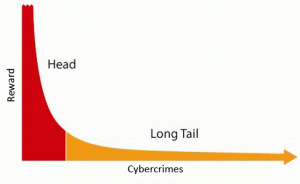Archive for the ‘Criminology’ tag
Online Identity – Second Post no comments
Revised Brief:
This week I have revised my original Brief to observe the concept of ‘online identity’ from both a sociological and criminological perspective. Unfortunately, there was little information to be found on this area from a political view, thus this subject has been discounted.
The area of Criminology poses very interesting research questions in regards to the concept of online identity. In particular how anonymity online could be potentially used by individuals perpetuating criminal activities. This varies from individuals pretending to be reputable organisations, perhaps asking for bank details or other personal information; to sex offenders being able to use particular online identities, different from their real-world self, to groom children. How criminals may manipulate and use online identity is quite fascinating.
This Week’s Achievements:
This week I have focused my reading on two Sociology textbooks:
1) Sassen, S, ‘A Sociology of Globalization’ (W.W. Norton & Company Inc, London, 2007)
This book, although not particularly relevant to the concept of online identity, was useful when considering how the Web has affected society on a global scale; perhaps helping to underpin the concept of globalisation. However, this book is also valuable in illustrating the basic principles of sociological methodology, which seems in this instance to be built upon different studies and statistics produced by a variety of sociologists in a particular area.
2) Nunes, M, ‘Cyberspaces of Everyday Life,’ ( University of Minnesota Press, London, 2002)
This book offers a socio-cultural view on the Web and various aspects of online identity. From how identity is used in online e-Learning, such as the University of Phoenix, where many individuals use pseudonyms instead of real names; to websites that seems to allow the expression of one part of a user’s identity, such as a parenting website. Nunes argues on this parenting website users’ identity does not seem to go beyond the realms that they are parents, anything else about identity is irrelevant. Furthermore, this book offers interesting insights into how online identity may be free from: gender, race, sexuality and social-class, and how in turn this may impact on social interaction.
Next Week’s Aims:
After contacting the School of Social Sciences in regards to issues surrounding the concept of identity on the Web, the following textbooks were kindly recommended:
- Muncie et al, ‘Criminological Perspectives’ (2nd edit.,) – used at level two for Criminology.
- Yvonne Jewkes and Majid Yar, ‘Handbook of Internet Crime’ – contains chapters relevant to the issue of identity.
- Giddens, ‘A Sociology’ – provides a good overview of Sociology (used by undergraduate sociologists)
Therefore, next week my aim is to have found these three textbooks in Hartley library and to create a short summary about each.
The Criminology and Economic incentives behind Cybercrimes no comments
The prevailing assumption of cybercrime is that it is a massive threat that could cause unimaginable chaos to society. However, this is just a virtual threat. The reality is that cybercrimes most often involve small impact bulk victimisations which can be individually insignificant but collectively significant. Most cybercriminals target the long tail of crime where they prefer to commit more crimes with less gain. An example of that would be a cybercriminal scamming 50 million people for £1.

Such a model of crime has several advantages over traditional models of crime as individually insignificant amount of losses means:
1. Victims would be less bothered about reporting the crime
2. Police less likely to get involved
3. Credit card companies less bothered
For more information, please see the presentation on “Organized Crime and the Organization of Cybercrime” given by David Wall.
The study of cybercrime requires a multidisciplinary approach as the society is affected. Economics, law, sociology, psychology and criminology are just some of the disciplines involved. It is my intention to understand cybercrimes from the economics and criminology perspective so that I can have a better understanding on why cybercrimes occur.
Economics
After reading the presentation on “How Economics and Information Security Affects Cyber Crime and What This Means in the Context of a Global Recession” given by Peter Guerra, I believe that by understanding more about the economic incentives behind cybercrime, that is, the incentives to commit crime and the incentives to protect from crime, I would gain a better understanding of the rationale behind cybercrimes and whether critical points can be identified using economic theories.
The economic books which I’m proposing to read are:
- Microeconomics: Principles and analysis by F.A. Cowell
- Economics (6th Ed) by J. Sloman
Criminology
Criminology is the study of crimes and by studying criminology, I’m looking to develop an understanding on the theories in criminology and an imaginative mind on crimes so that not only I can understand why crimes occur but can also anticipate when and where crime is likely to occur. There are three textbooks I’ve found which are relevant:
- Criminology: The Basics by Sandra Walklate
- The Oxford Handbook of Criminology by Mike Maguire, Rod Morgan, and Robert Reiner
- Cybercrime: The Transformation of Crime in the Information Age by David S. Wall
- Handbook of Internet Crime by Yvonne Jewkes and Majid Yar